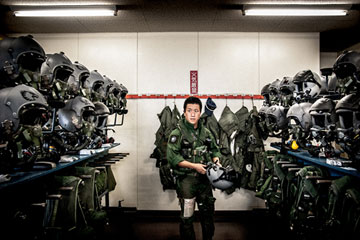
These days, Japanese pilot Kohta "Vader" Araki, who flies F-15s, is always on alert.
(3 of 7)
In July, Abe received a warm welcome in the Philippines, where Japanese soldiers had presided over the murderous 1942 Bataan death march. Manila is embroiled in its own territorial conflict with Beijing over disputed isles and shoals in the South China Sea, a vast waterway that China claims as nearly all its own. Abe came to town with promises of 10 cutters to upgrade the Philippine coast guard. In September, Japanese warships docked in Philippine ports, followed by U.S. armed forces who conducted joint war games with their Philippine counterparts. (In the early 1990s, U.S. military bases in the Philippines were closed because of local opposition, but the current government has indicated interest in a renewed American military presence.) "Japan has every right to enhance its military capability due to China's provocation," says Clarita Carlos, a former president of the National Defense College of the Philippines. "The Chinese are always playing the we-were-colonized-by-the-Japanese card. All of us have been there. We do remember, but we also know how to forgive."
Security Fixation
Besides forgiveness, Japan needs revival. The country has been wounded by more than two decades of economic stagnation and was hit hard by the 2011 earthquake, tsunami and nuclear crisis that claimed nearly 20,000 lives. Abe, who during his first stint as Prime Minister in 2006 became the nation's youngest postwar leader, has projected himself as a bold changemaker. Since taking office again in December, he has launched a reform program, dubbed Abenomics, that aims to use monetary expansion and fiscal stimulus to goose Japan's long-deflated economy. In September, the national mood was buoyed when Tokyo was awarded the 2020 Olympics, despite international concerns over radioactive water leaking from a tsunami-damaged nuclear power plant. "I want to make the Olympics a trigger," Abe said, "for sweeping away 15 years of deflation and economic decline." In a February speech in Washington, he proclaimed, "Japan is back."
The LDP's slogan is "Restore Japan," and Abe has explicitly linked any economic recovery to Japan's ability to protect its sovereignty. "Japan's beautiful seas and its territory are under threat, and young people are having trouble finding hope in the future amid an economic slump," he said in September 2012, as the Senkaku-Diaoyu row with China heated up. "I promise to protect Japan's land and sea, and the lives of the Japanese people, no matter what." This year, Japan's defense budget increased for the first time in 11 years--by a paltry 0.8%, yes, but a clear signal from the Abe administration of the importance it places on national security. In August, the Defense Ministry requested a 3% rise in next year's spending, which would be the biggest jump in more than two decades.
